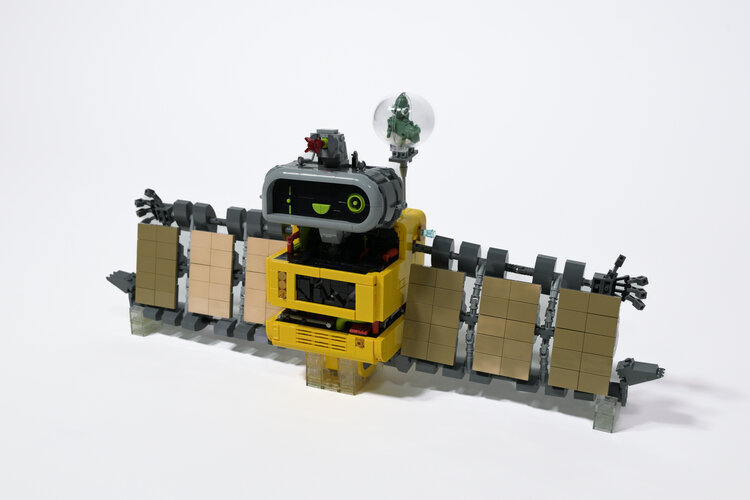
Copernical Team
Spaceo leads ESA project to deploy inflatable sail for satellite disposal
 A European initiative spearheaded by Portuguese start-up Spaceo has secured a European Space Agency (ESA) contract to create a novel solution for clearing obsolete satellites and debris from orbit.
The program, called SWIFT (Spacecraft With Inflatable Termination), has received euro 3 million in funding to develop a deployable sail-like structure that acts as a drag device to hasten the d
A European initiative spearheaded by Portuguese start-up Spaceo has secured a European Space Agency (ESA) contract to create a novel solution for clearing obsolete satellites and debris from orbit.
The program, called SWIFT (Spacecraft With Inflatable Termination), has received euro 3 million in funding to develop a deployable sail-like structure that acts as a drag device to hasten the d 332nd ESA Council: Media information session
 Video:
00:34:08
Video:
00:34:08
Watch the media information session in which ESA Director General Josef Aschbacher and ESA Council Chair Renato Krpoun (CH) update journalists on the key decisions from the ESA Council meeting, held at ESA Headquarters in Paris on 19 and 20 March 2025.
Read ESA's Strategy 2040

ESA's Strategy 2040
Read the Five Goals
Hera’s incredible adventures in brick building

After a hectic four years of work ESA’s Hera mission for planetary defence was launched into space and has just flown by Mars. As a keepsake of the spacecraft they channelled so much effort into, the Hera team also commissioned the building of a detailed model made with LEGO® bricks – as well as smaller variants that you can go ahead and build for yourself!
Senior defense leaders emphasize readiness amid resource challenges
 Senior officers from the Air Force and Space Force addressed the Senate Armed Services Subcommittee on Readiness and Management Support on March 12, emphasizing that both branches remain mission-ready but are grappling with financial limitations and adversarial threats.
U.S. Air Force Deputy Chief for Operations Lt. Gen. Adrian Spain affirmed the force's preparedness: "I can confidently st
Senior officers from the Air Force and Space Force addressed the Senate Armed Services Subcommittee on Readiness and Management Support on March 12, emphasizing that both branches remain mission-ready but are grappling with financial limitations and adversarial threats.
U.S. Air Force Deputy Chief for Operations Lt. Gen. Adrian Spain affirmed the force's preparedness: "I can confidently st SES and Lynk Partner to Expand Direct to Device Network Services
 SES and Lynk Global have entered into a strategic alliance aimed at accelerating growth in the direct-to-device (D2D) satellite communications sector. Under the terms of the agreement, SES will invest in Lynk Global's Series B funding round and deliver a range of integrated services designed to boost Lynk's D2D network performance.
One key feature of the collaboration is the implementation
SES and Lynk Global have entered into a strategic alliance aimed at accelerating growth in the direct-to-device (D2D) satellite communications sector. Under the terms of the agreement, SES will invest in Lynk Global's Series B funding round and deliver a range of integrated services designed to boost Lynk's D2D network performance.
One key feature of the collaboration is the implementation Globalstar launches advanced control center in Louisiana to boost satellite operations
 Globalstar, Inc. (Nasdaq: GSAT) has inaugurated a cutting-edge Satellite Operations Control Center (SOCC) at its Covington, Louisiana headquarters on March 17, marking a major upgrade in its operational infrastructure and a step forward in its strategy to enhance satellite and connectivity services.
Prominent officials, including House Majority Leader Steve Scalise and FCC Chairman Brendan
Globalstar, Inc. (Nasdaq: GSAT) has inaugurated a cutting-edge Satellite Operations Control Center (SOCC) at its Covington, Louisiana headquarters on March 17, marking a major upgrade in its operational infrastructure and a step forward in its strategy to enhance satellite and connectivity services.
Prominent officials, including House Majority Leader Steve Scalise and FCC Chairman Brendan Constellation of student-built satellites launched into orbit from California
 A record-setting constellation of nine nanosatellites, developed by Israeli high school students, has been successfully launched into low Earth orbit from Vandenberg Space Force Base in California. Spearheaded by the Ministry of Innovation, Science, and Technology alongside Tel Aviv University and nine local municipalities, the mission marks the largest satellite formation ever deployed by Israe
A record-setting constellation of nine nanosatellites, developed by Israeli high school students, has been successfully launched into low Earth orbit from Vandenberg Space Force Base in California. Spearheaded by the Ministry of Innovation, Science, and Technology alongside Tel Aviv University and nine local municipalities, the mission marks the largest satellite formation ever deployed by Israe Clarity1 satellite begins VLEO mission after successful deployment
 Albedo has confirmed the successful deployment of its Clarity-1 satellite into orbit aboard SpaceX's Transporter-13 Rideshare mission, which launched from Vandenberg Space Force Base in California. Shortly after reaching orbit, the satellite established communication with Albedo's Mission Operations team and began executing initial commissioning protocols.
Within four hours of separating f
Albedo has confirmed the successful deployment of its Clarity-1 satellite into orbit aboard SpaceX's Transporter-13 Rideshare mission, which launched from Vandenberg Space Force Base in California. Shortly after reaching orbit, the satellite established communication with Albedo's Mission Operations team and began executing initial commissioning protocols.
Within four hours of separating f Big Wheel galaxy challenges early cosmic formation theories
 An international collaboration led in part by Swinburne University of Technology has uncovered a massive spiral disk galaxy from the early universe, providing new insights into galactic formation.
The discovery, made serendipitously through observations with the James Webb Space Telescope (JWST), revealed a disk galaxy from a time just two billion years after the Big Bang - roughly eleven
An international collaboration led in part by Swinburne University of Technology has uncovered a massive spiral disk galaxy from the early universe, providing new insights into galactic formation.
The discovery, made serendipitously through observations with the James Webb Space Telescope (JWST), revealed a disk galaxy from a time just two billion years after the Big Bang - roughly eleven 































